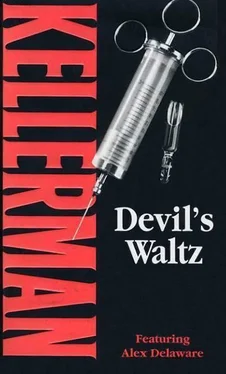“When did you get so wise?”
“It’s always been there, Curly. You just have to have your eyes open.”
Alone again, I felt like jumping out of my skin. I called my service. Four messages: a lawyer asking me to consult on a child custody case, someone with an M.B.A. promising to help me build my practice, the county psychological association wanting to know if I was going to attend the next monthly meeting and, if so, did I want chicken or fish. The last, from Lou Cestare, letting me know he’d found nothing new on George Plumb’s former employers but would keep trying.
I tried Milo again, on the off chance he’d returned from the deputy chief’s office. Charles Flannery’s voice came on and I hung up.
What was Stephanie up to, meeting with Huenengarth?
Just malignant careerism or had someone leaned on her, too — the old drunk-driving arrest.
Or maybe her drinking wasn’t ancient history. What if the drinking was still out of control and they were exploiting that ?
Exploiting while grooming her for division head?
It didn’t make sense — but maybe it did.
If I was right about Chuck Jones wanting to dissolve the hospital, hiring an impaired division head would fit beautifully.
Rat climbing aboard a sinking ship...
I thought of someone who’d jumped off.
What had made Melendez-Lynch finally leave?
I didn’t know if he’d talk to me. Our last contact, years ago, had been tainted by his humiliation — a case gone very bad, a lapse of ethics on his part that I’d learned about without wanting to.
But what was there to lose?
Miami Information had one listing for him. Our Lady of Mercy Hospital. It was eight-thirty in Florida. His secretary would be gone, but unless Raoul had undergone a personality transplant, he’d still be working.
I dialed. A recorded voice, female and cultured, informed me I’d reached the chief physician’s office, which was now closed, and enunciated a series of touch-tone codes for reaching Dr. Melendez-Lynch’s voice mail.
I pressed the Instant Page code and waited for a callback, wondering when machines were going to start calling one another and eliminating the messiness of the human factor.
A still-familiar voice said, “Dr. Melendez-Lynch.”
“Raoul? It’s Alex Delaware.”
“ Ahleex ? No keeding. How are you?”
“Fine, Raoul. And you?”
“Much too fat and much too busy, but otherwise superb... What a surprise. Are you here in Miami?”
“No, still in L.A.”
“Ahh... So tell me, how have you been spending the last few years?”
“Same as before.”
“Back in practice?”
“Short-term consults.”
“Short term... still retired, eh?”
“Not exactly. How about you?”
“Also more of the same, Alex. We are doing some very exciting things — advanced cell-wall permeability studies in the carcinogenesis lab, several pilot grants on experimental drugs. So tell me, to what do I owe the honor of this call?”
“I’ve got a question for you,” I said, “but it’s personal, not professional, so if you don’t want to answer it, just say so.”
“Personal?”
“About your leaving.”
“What do you want to know about it?”
“Why you did it.”
“And why, may I ask, are you suddenly so curious about my motivation?”
“Because I’m back at Western Peds, consulting on a case. And the place looks really sad , Raoul. Low morale, people quitting — people I never thought would leave. You’re the one I know best, so I’m calling you.”
“Yes, that is personal,” he said. “But I don’t mind answering.” He laughed. “The answer is very simple, Alex. I left because I was unwanted.”
“By the new administration?”
“Yes. The Visigoths. The choice they gave me was simple. Leave, or die professionally. It was a matter of survival. Despite what anyone will tell you, money had nothing to do with it. No one ever worked at Western Peds for the money — you know that. Though the money got worse, too, when the Visigoths took control. Wage freezes, hiring freezes, eating away at our secretarial staff, a totally arrogant attitude toward the physicians — as if we were their servants. They even stuck us out on the street in trailers. Like derelicts. I could tolerate all of that because of the work . The research. But when that ended, there was simply no reason to stay on.”
“They cut off your research?”
“Not explicitly. However, at the beginning of the last academic year the board announced a new policy: Because of financial difficulties, the hospital would no longer chip in for overhead on research grants. You know how the government works — on so many grants, any money they give you depends upon the host institution contributing expenses. Some of the private foundations are also insisting upon it now. All of my funding came from NCI. A no-overhead rule essentially nullified all of my projects. I tried to argue, yelled, screamed, showed them figures and facts — what we were trying to do with our research; this was pediatric cancer , for God’s sake. No use. So I flew to Washington and talked with government Visigoths, trying to get them to suspend the rules. That, too, was futile. Our kinder and gentler bunch, eh? None of them functions at a human level. So what were my options, Alex? Stay on as an overeducated technician and give up fifteen years of work?”
“Fifteen years,” I said. “Must have been hard.”
“It wasn’t easy, but it turned out to be a fantastic decision. Here, at Mercy, I sit on the board as a voting member. There are plenty of idiots here, too, but I can ignore them. As a bonus, my second child — Amelia — is enrolled at the medical school in Miami and lives with me. My condominium overlooks the ocean and on the rare occasion I visit Little Havana, it makes me feel like a little boy. It was like surgery, Alex. The process was painful but the results were worth it.”
“They were stupid to lose you.”
“Of course they were. Fifteen years and not even a gold watch.” He laughed. “These are not people who hold physicians in awe. All that matters to them is money.”
“Jones and Plumb?”
“And that pair of dogs trailing after them — Novak and whatever. They may be accountants but they remind me of Fidel’s thugs. Take my advice, Alex: Don’t get too involved there. Why don’t you come out to Miami and put your skills to use where they’ll be appreciated? We’ll write a grant together. The AIDS thing is paramount now — so much sadness. Two thirds of our hemophiliacs have received infected blood. You could be useful here, Alex.”
“Thanks for the invitation, Raoul.”
“It’s a sincere one. I remember the good we did together.”
“So do I.”
“Think about it, Alex.”
“Okay.”
“But of course you won’t.”
Both of us laughed.
I said, “Could I ask you one more thing?”
“Also personal?”
“No. What do you know about the Ferris Dixon Institute for Chemical Research?”
“Never heard of it. Why?”
“It funded a doctor at Western Peds. With overhead.”
“Really. And which guy is this?”
“A toxicologist named Laurence Ashmore. He’s done some epidemiologic work on childhood cancer.”
“Ashmore... never heard of him either. What kind of epidemiology does he do?”
“Pesticides and malignancy rates. Mostly theoretical stuff, playing with numbers.”
He snorted. “How much did this institute give him?”
“Nearly a million dollars.”
Silence.
“What?”
“It’s true,” I said.
Читать дальше












